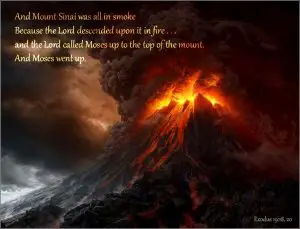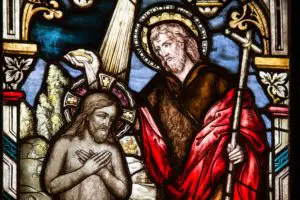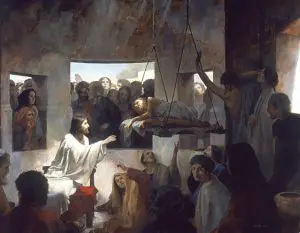Post-biblical orthodoxy has long held that Jesus created the world. Passages such as Genesis 1:26, John 1:1-3 and Colossians 1:15-18, when viewed through a Nicene lens, appear to some to support this interpretation. Another passage that is often referenced is found in Hebrews:
Hebrews 1:1-2 (NASB) God, after He spoke long ago to the fathers in the prophets in many portions and in many ways, 2 in these last days has spoken to us in His Son, whom He appointed heir of all things, through whom also He made the world.
The author[1] of the letter to the Hebrews wrote primarily to Jewish Christians in order to demonstrate from the Old Testament[2] that Jesus is greater than the angels, the prophets, the priesthood, and Moses.[3] But was he trying to convey that Jesus is greater because he is the Creator God? If that were the case, he could have saved himself time and effort by simply stating that Jesus is God, and therefore, he is intrinsically greater than all. But that’s not what the author wrote because it’s not what he was trying to convey. Rather, his point is that Jesus is greater because he is the Christ (Messiah), God’s chosen heir and king. Let’s take a look closer look at the passage in question.
In these last days God has spoken to us in His Son
In the opening verses of the letter, the author distinguishes between God and His son, that is, Jesus. Note that God is the one who spoke, whereas the prophets and Jesus are those in or through whom He spoke:
Hebrews 1:1-2 (NASB) God, after He spoke long ago to the fathers in the prophets in many portions and in many ways, 2 in these last days has spoken to us in His Son… (emphasis added)
God spoke to the fathers via prophets
When Moses led the people out of Egypt, they camped at Mt. Sinai. God came down on the mountain and spoke to His people directly. It terrified them to such a degree that they petitioned God to speak to them through His prophet instead. [4] God responded by saying that they had spoken well and that He would raise up another prophet, like Moses, to speak to them in the future:
 Deuteronomy 18:18 (NASB) I will raise up a prophet from among their countrymen like you, and I will put My words in his mouth, and he shall speak to them all that I command him. (emphasis added)
Deuteronomy 18:18 (NASB) I will raise up a prophet from among their countrymen like you, and I will put My words in his mouth, and he shall speak to them all that I command him. (emphasis added)
After Pentecost, the apostle Peter indicated that Jesus is the prophet of whom God spoke. [5]
In these few verses, we have discovered that a prophet is one who speaks on behalf of God. The fact that Jesus is the promised prophet helps us understand that he is not God because God cannot be His own prophet. If Jesus is God, it would be a violation of the promise God made from Mt. Sinai not to speak directly to the people. Surely, we dare not accuse God of breaking His promise.[6] What’s more, we have Jesus’ own testimony that he is a man who speaks on God’s behalf:
John 8:40 (NASB) “But as it is, you are seeking to kill Me, a man who has told you the truth, which I heard from God; this Abraham did not do. (emphasis added)
Indeed, Jesus repeatedly said that he spoke only what the Father had given him to say. For example:
John 8:28 (NASB) So Jesus said, “When you lift up the Son of Man, then you will know that I am He, and I do nothing on My own initiative, but I speak these things as the Father taught Me. (emphasis added)
John 12:49-50 (NASB) “For I did not speak on My own initiative, but the Father Himself who sent Me has given Me a commandment as to what to say and what to speak. 50 “I know that His commandment is eternal life; therefore the things I speak, I speak just as the Father has told Me.” (emphasis added)
It should give every student of the Bible pause to read that Jesus, the supposed Word Incarnate, didn’t speak on his own, but relied on God the Father to teach him what to say. This in itself should cause us to revisit what we’ve been taught about Jesus preexisting as the logos. Furthermore, those who contend that Jesus is the Angel of the Lord seen in the Old Testament should take note that the author of Hebrews states that God did not speak to us through His Son until these last days, that is, until the time of Jesus’ ministry. Therefore, the Angel of the Lord, who spoke on God’s behalf in the Old Testament, is not the pre-incarnate Jesus.
God has appointed him heir of all things
It is this prophet, the author of Hebrews tells us, that God appointed heir of all things:
Hebrews 1:1-2 (NASB) God, after He spoke long ago to the fathers in the prophets in many portions and in many ways, 2 in these last days has spoken to us in His Son, whom He appointed heir of all things, through whom also He made the world. (emphasis added)
The fact that God appointed Jesus heir of all things means that all things did not previously belong to him. How can this be? If Jesus is God the Creator, he would inherently possess all things. Clearly, you cannot inherit what you already own. Rather, an inheritance is a gift that the owner, in this case, God, gave to His chosen heir. This truth is beautifully captured by the psalmist who recorded God prophetically addressing His messiah, the future king:
Psalm 2:8 (NASB) Ask of Me, and I will surely give the nations as Your inheritance, and the very ends of the earth as Your possession. (emphasis added)
If Jesus is God, this passage, along with Hebrews 1:2, makes no sense as the nations, even the very ends of the earth, would already belong to him. However, if Jesus is the human Messiah, it makes complete sense, and it is in keeping with who the Scriptures say Jesus is.
Jesus shared a parable about the son of a vineyard owner who was to receive his father’s property as an inheritance. Wicked slaves killed the son in hopes of inheriting the vineyard  themselves. The parallels to Jesus and the kingdom of God are as obvious to us as they were to his original audience. [7] The point being, Jesus is not the land owner, but the one chosen by the Father to inherit the land, i.e., the coming kingdom. Remarkably, God has designated those who believe Jesus is the Christ as co-heirs with His Son:
themselves. The parallels to Jesus and the kingdom of God are as obvious to us as they were to his original audience. [7] The point being, Jesus is not the land owner, but the one chosen by the Father to inherit the land, i.e., the coming kingdom. Remarkably, God has designated those who believe Jesus is the Christ as co-heirs with His Son:
Romans 8:16-17 (NIV) The Spirit himself testifies with our spirit that we are God’s children. 17 Now if we are children, then we are heirs–heirs of God and co-heirs with Christ, if indeed we share in his sufferings in order that we may also share in his glory. (emphasis added)
It’s important to see that believers are heirs with Christ and not of Christ. In other words, we will share in the inheritance that Jesus receives from God. However, if Jesus is God, and therefore the owner of all things, we would be called heirs of Christ and not heirs with him.
Through whom also He (God) made the world
Who did the traditional Jews believe the Creator to be? Quite simply, they would have believed what the Old Testament taught:
Isaiah 44:24 (NASB) Thus says the LORD, your Redeemer, and the one who formed you from the womb, “I, the LORD, am the maker of all things, Stretching out the heavens by Myself and spreading out the earth all alone (emphasis added)
Isaiah 45:18 (NASB) For thus says the LORD [Yahweh], who created the heaven (He is the God who formed the earth and made it, He established it and did not create it a waste place, but formed it to be inhabited), “I am the LORD, and there is none else. (emphasis added)
The fiercely monotheistic Jews believed the one God to be the Father. Moreover, they believed the Scriptures which said that He alone formed Creation. They had no concept of a triune God or a preexistent Son because these post-Biblical concepts had yet to be developed. What then would they have understood this passage to mean?
Hebrews 1:1-2 (NASB) God, after He spoke long ago to the fathers in the prophets in many portions and in many ways, 2 in these last days has spoken to us in His Son, whom He appointed heir of all things, through whom also He [God] made the world. (emphasis added)
The word through in the Greek is dia, a preposition that can also be translated: on account of, for whom, for the sake of, because of.[8] Thus, the phrase can be translated as: on account of whom [God] made the world. Or for the sake of whom [God] made the world. Or because of whom, [God] made the world.
The word world, especially when used in conjunction with words like made, causes us to think it is a reference to the Genesis creation. But the word world in this verse is the Greek aiôn which literally means ages; an age, a cycle of time. Thus, world here is not a reference to the Genesis creation. On the contrary, the created world is referred to as the kosmos in Greek. Many translators agree that world here is better translated as age or ages. For example, Young’s Literal Translation, the Berean Literal Bible, the Weymouth Translation, the New Heart English Bible, and the Jubilee Bible, among others, translate aiôn in this way. Furthermore, the New American Standard Bible, the Holman Bible, and others include a footnote in their translations stating that world is literally the word ages.
The question is, if these translators know that aiôn is actually the word age or ages, why did they translate it as world? Could it be because world better supports their bias that Jesus is the Creator? Regardless of the translators’ intent, the author of Hebrews emphasizes the correct translation when he states in the same context, that he is referring to the world to come.
Hebrews 2:5 (NASB) For He (God vs 4) did not subject to angels the world to come, concerning which we are speaking. (emphasis added)
The word world here is the Greek oikoumenē, and it means the inhabited land or earth. In this context, it is a reference to the new earth that is to come in the kingdom age.[9] Thus, according to Hebrews, God created the coming age because of or on behalf of His Son, the Messiah (anointed king).
Some may question why Hebrews 1:2 says that the age or aiôn was made (past tense) if it refers to the future kingdom. Even though the kingdom age has yet to come, like other things in God’s plan, it is spoken of as if it has already been accomplished. This figure of speech, known as prolespsis, is used frequently in Scripture to express a “future act or development” as if it is “already accomplished or existing.”[10] Indeed, the author of Hebrews speaks of God’s works as being “finished from the foundation of the world.”[11] Jesus also speaks of the coming kingdom as having been prepared from the foundation of the world:
Matthew 25:34 (NASB) “Then the King will say to those on His right, ‘Come, you who are blessed of My Father, inherit the kingdom prepared for you from the foundation of the world. (emphasis added)
God’s plan for the coming kingdom is so certain that it is counted as having already been accomplished.
When will the kingdom of God come?
In summary, the context of Hebrews 1:1-2 says nothing of the Genesis creation or Jesus being the agent of Creation. Rather the author is speaking of the coming age. In these last days, God has spoken to us through His promised prophet, Jesus the Christ, whom He appointed heir of all things and on account of whom He made the  coming kingdom.
coming kingdom.
Although this “present evil age”[12] is being ruled by Satan,[13] the book of Revelation tells us that the kingdom age will be inaugurated at the seventh trumpet. At that time Christ will receive his inheritance and take his place as God’s appointed heir and ruler:
Revelation 11:15 (NASB) Then the seventh angel sounded; and there were loud voices in heaven, saying, “The kingdom of the world has become the kingdom of our Lord and of His Christ; and He will reign forever and ever.” (emphasis added)
What a glorious day that will be!
(If you’d like to continue to examine the next verses in this chapter: Hebrews 1:3-4 )
[1] Paul, Barnabas, Apollos, and Clement of Alexandria are among those who have been considered as potential authors, however, there is no consensus among scholars, past or present.
[2] Hebrews contains eighty-six direct or indirect quotes and allusions to the Old Testament, the most of any New Testament book, save the gospel of Matthew. Blue Letter Bible, accessed 11-14-19. https://www.blueletterbible.org/study/pnt/pnt08.cfm
[3] Some scholars believe the author of Hebrews addressed these particular points because Hellenized Jews esteemed angels and Moses because of their role in mediating the covenant of God on Mt. Sinai (Acts 7:38, 53; Gal 3:19). The author stresses that Jesus is superior to even these esteemed mediators.
[4] Exodus 20:18-19; Deuteronomy 5:4-5, 18:15-18.
[5] Peter’s sermons: Acts 3:19-26; 7:37, 51-53. Jesus is a prophet: Matt 13:57, 21:11; Luke 7:16; 24:19; John 4:19; 7:40ff; 17:8.
[6] Numbers 23:19.
[7] Mark 12:1-12.
[8] dia, #1223, New American Standard Greek Dictionary. It is the same preposition used in Colossians 1:16.
[9] Isaiah 65:17; 66:22; 2 Peter 3:13; Revelation 21:1.
[10] “Prolepsis,” Encyclopaedia Britannica, accessed 11-23-19, https://www.britannica.com/art/prolepsis-literature
[11] Hebrew 4:3.
[12] Galatians 1:4.
[13] 1 John 5:19. See also: John 12:31; 14:30; 16:11; 17:15; 2 Cor. 4:4; 1 John 4:4.




Thank you for providing such a thorough explanation of Hebrews 1:2!
Thanks Max! Appreciate the comment. Glad it was helpful!
God bless!